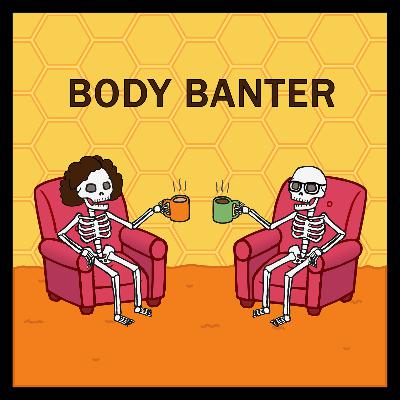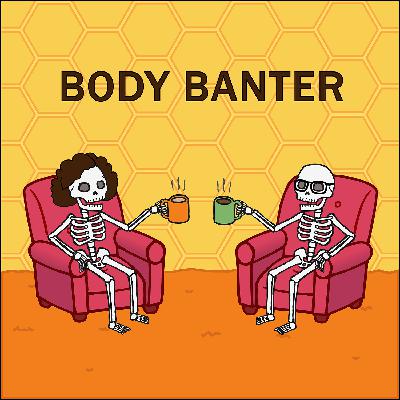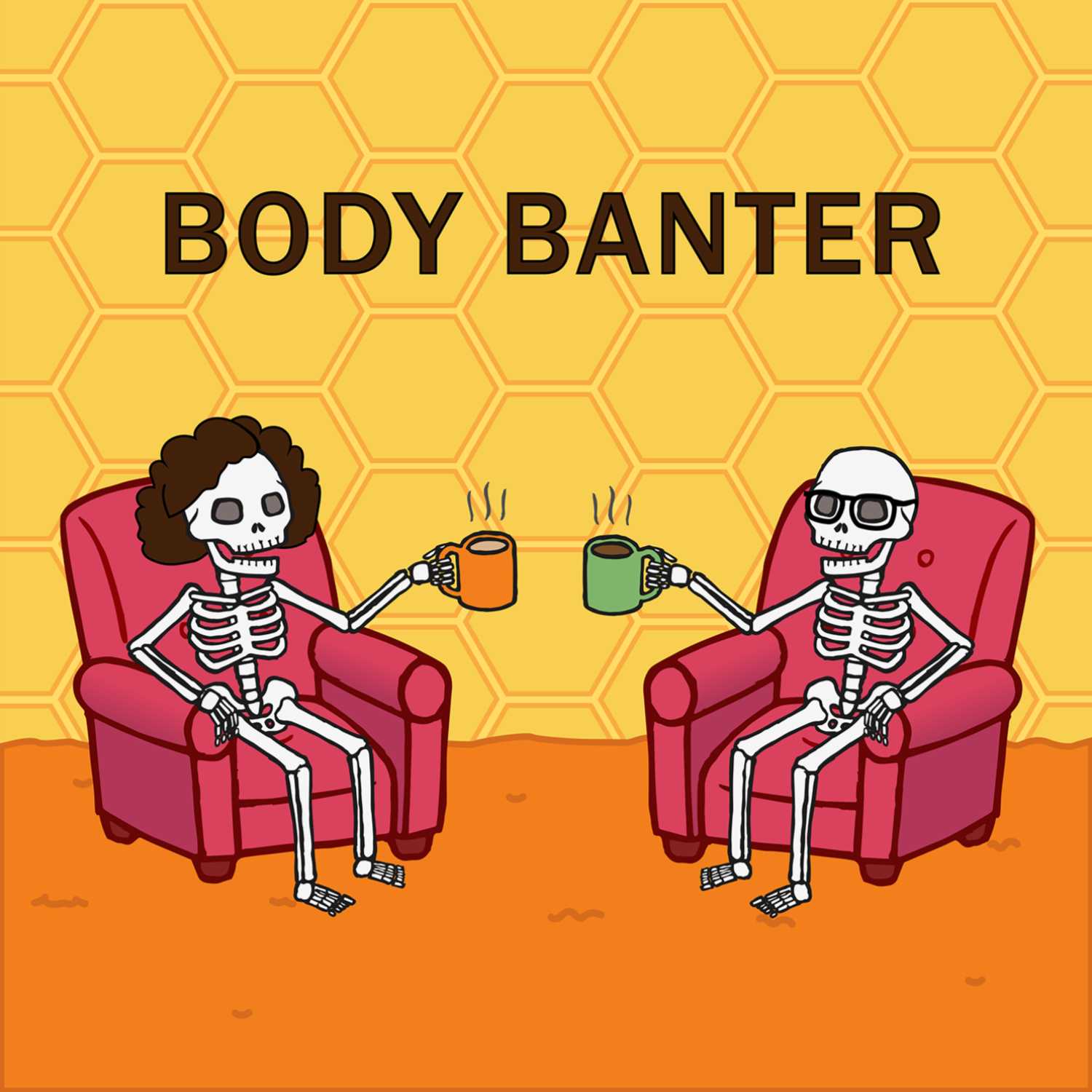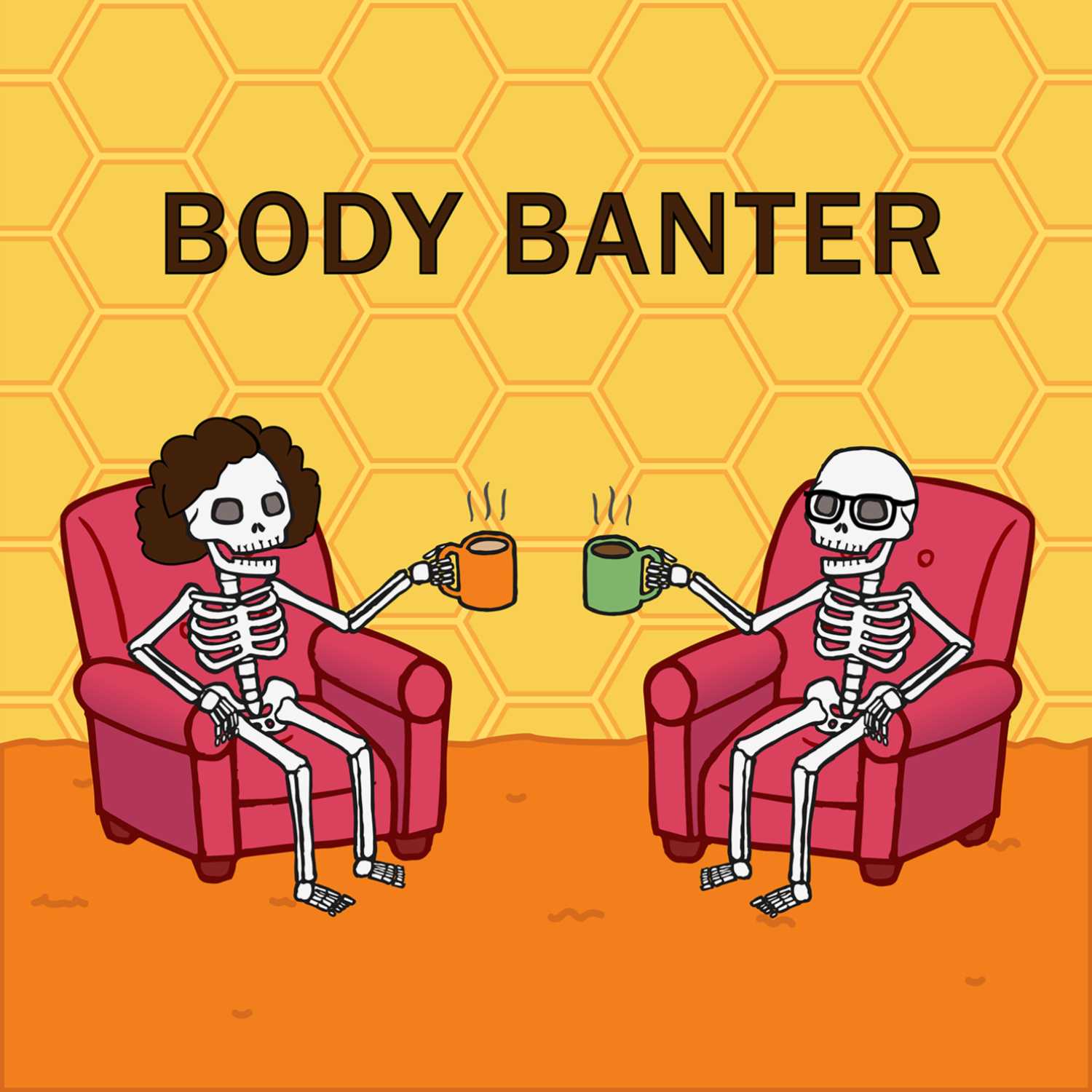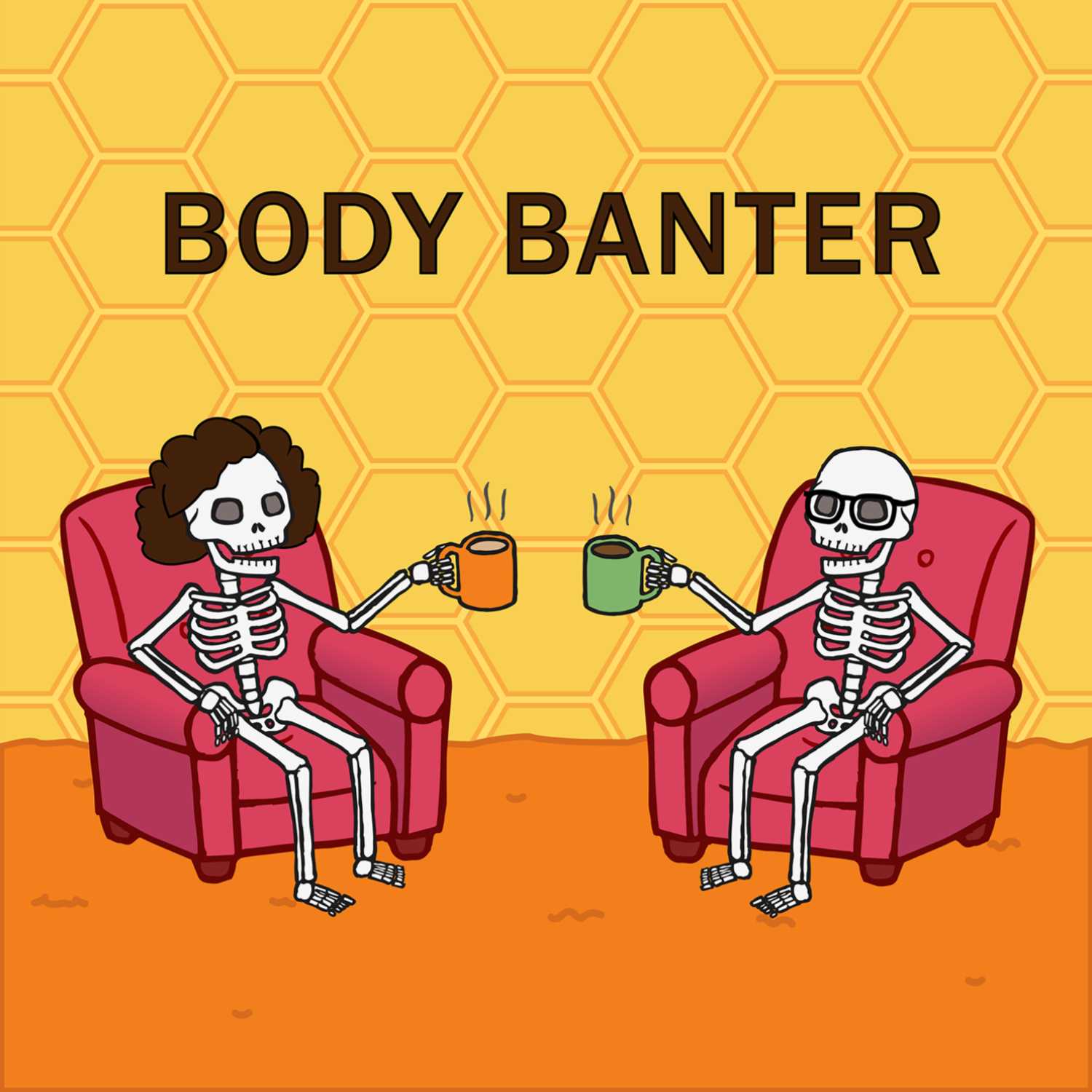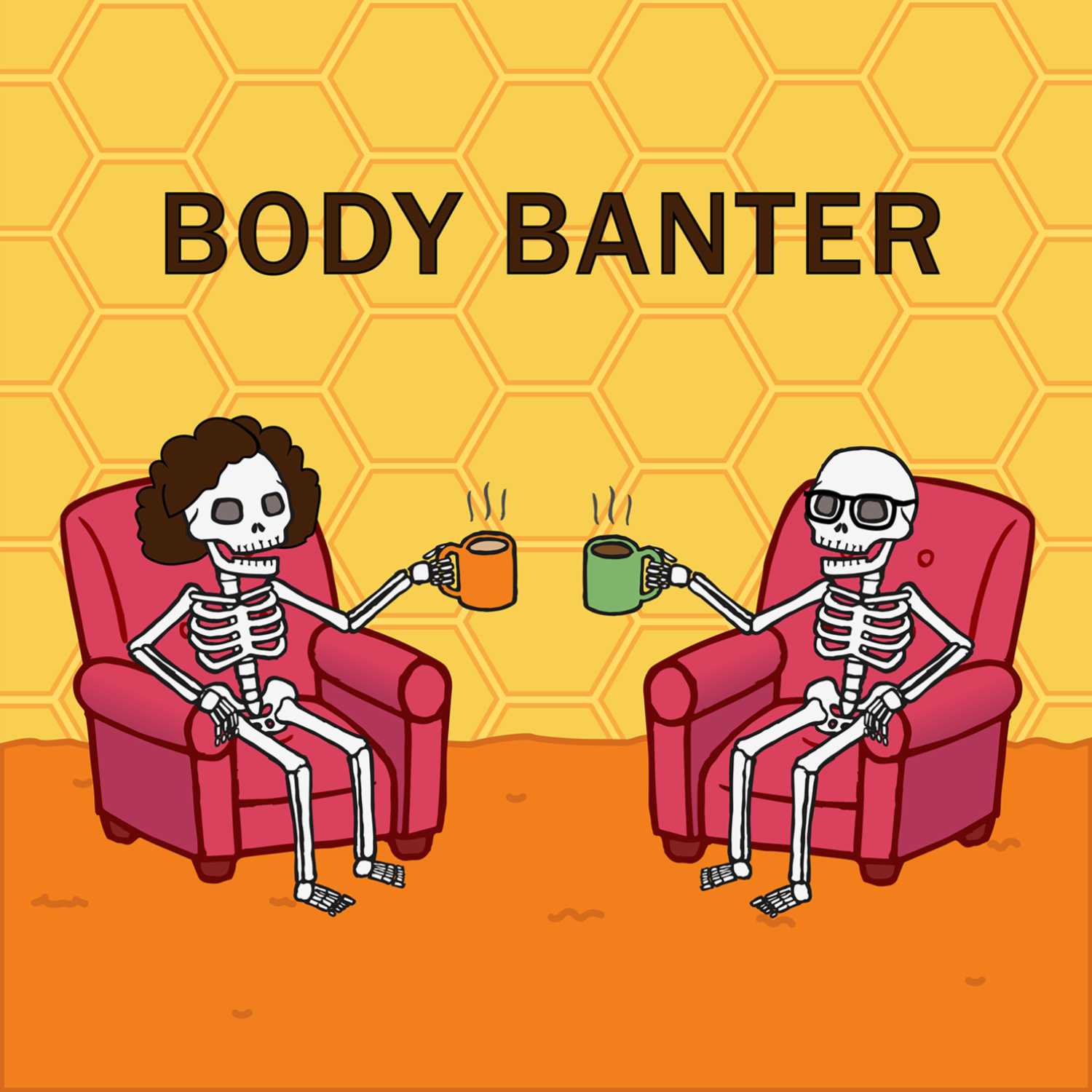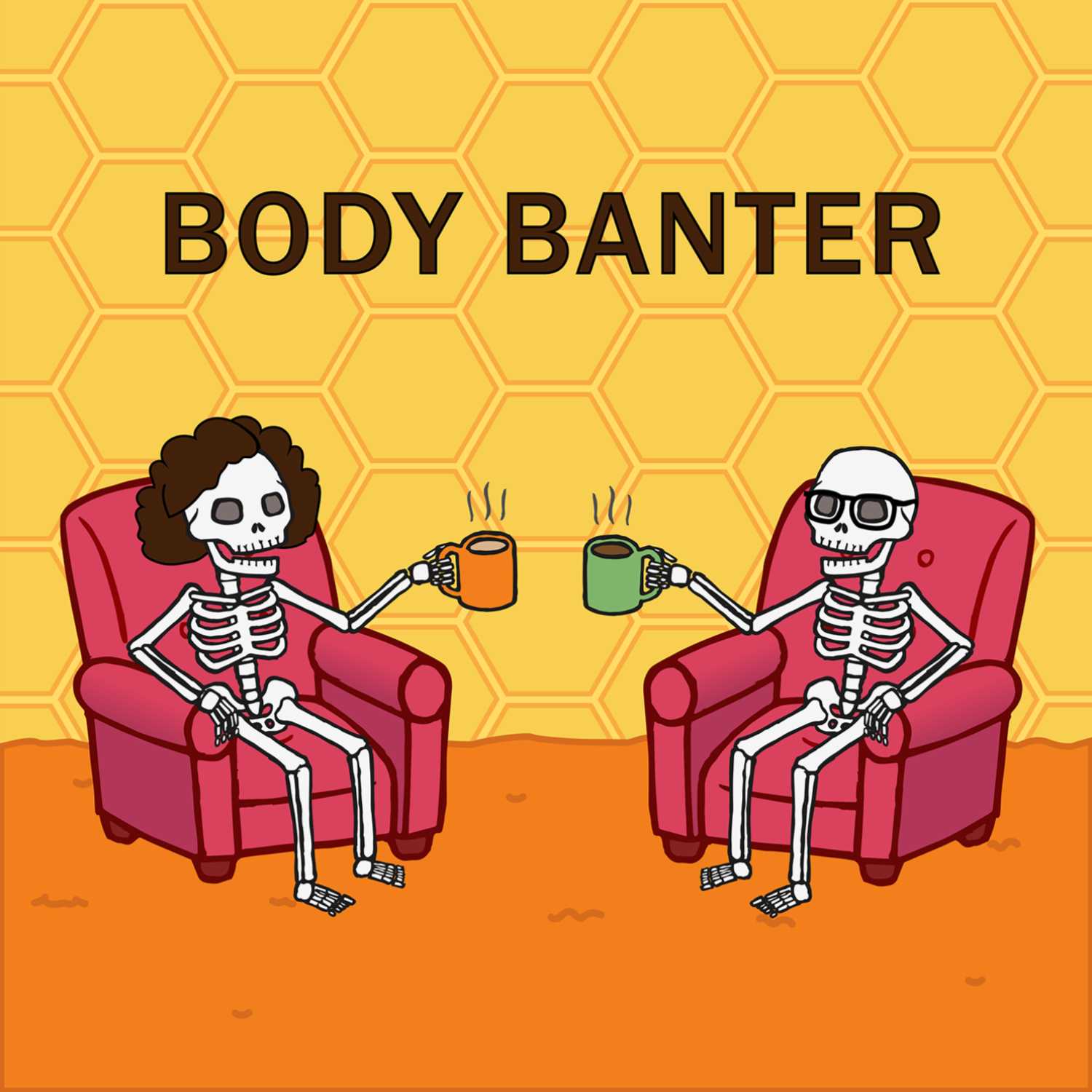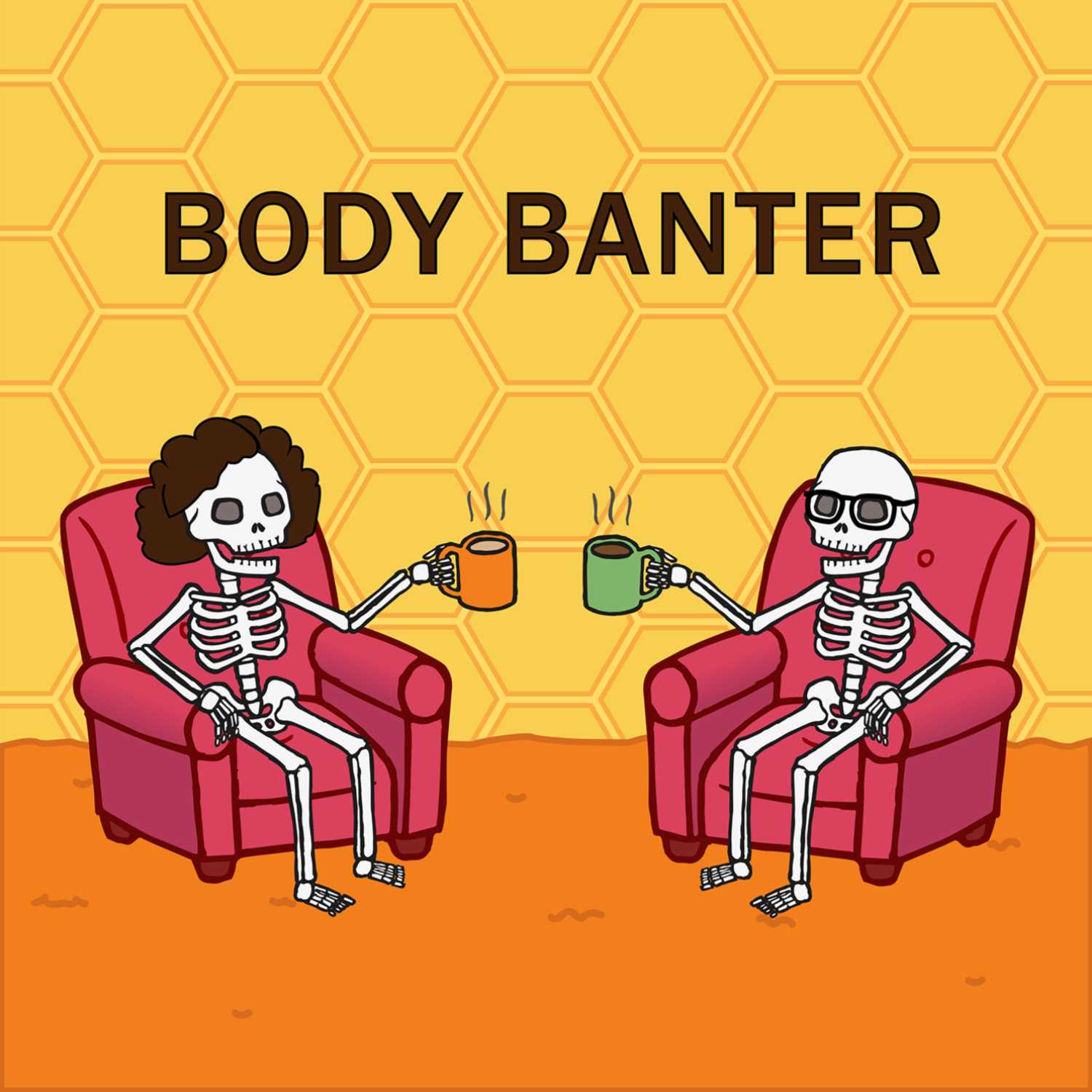Discover Body Banter
Body Banter

Body Banter
Author: The HIVE
Subscribed: 4Played: 38Subscribe
Share
© The HIVE 2022
Description
Welcome to Body Banter, a podcast where we explore different perspectives of the human body in all its forms! Our hosts, Dr. Claudia Krebs and Dr. Segun Oyedele, are joined by an amazing line up of guests to share their expertise and thoughts about what the human body means to them. Our guests come from all over the world and include researchers, clinicians, anatomy instructors, scholars of language and culture, and people with lived experiences navigating the healthcare system. Anatomy is for everybody and every body, and we are here to get the body banter going!
40 Episodes
Reverse
Welcome back to Body Banter after summer break! This month, Dr. Christine Palmay shares her perspective as a family physician passionate about preventative care, particularly immunizations. She explains how RSV, a highly contagious respiratory virus, impacts both infants and older adults, and discusses the recent advances in protection, including monoclonal antibodies for children and vaccines for older populations. Dr. Palmay emphasizes that good medicine is about prevention, urging patients to view vaccines as part of a broader investment in health, vitality, and time with loved ones. She also shares her holistic approach to healthcare, reminding listeners that staying well depends not only on science and vaccines but also on everyday basics like movement, connection, and self-care.
This time on Body Banter, Sarina M shares her powerful and personal experience living with long COVID following two severe infections. She describes the wide-ranging impacts on her body—from respiratory struggles and chronic fatigue to muscle pain and visual disturbances—as well as the emotional toll of navigating an invisible illness. Sarina emphasizes the importance of being believed and supported by healthcare professionals, highlighting the need for empathy and patient-centered care. Despite the challenges, she speaks with resilience about recovery, self-compassion, and rebuilding her relationship with her body.
In this episode, Martine Dunnwald shares her journey from studying pharmacy and cell biology in France to becoming a skin biologist and educator in the US. She describes how a chance research collaboration sparked her interest in craniofacial biology and how her resilience during funding challenges led her to discover a passion for teaching anatomy. Martine emphasizes the value of foundational anatomical sciences and interdisciplinary collaboration in both research and education. Her approach blends science, art, and music, reflecting a deep appreciation for the human body—especially the often-overlooked skin.
This week on Body Banter, Janet Philp shares her unconventional path into the field of anatomy, driven by a passion for accurate anatomical education. She discusses her research on the history of body donation, including the notorious Burke and Hare case, and examines how access to dissection is regulated. Janet also explores her innovative use of felted anatomical models, which make learning more interactive and accessible for both students and the public. Her work highlights the importance of rethinking how anatomy is taught, who has access to it, and how creative approaches can enhance understanding.
Welcome to the fifth season of Body Banter! In our opening episode, Professor Claire Smith shares her journey into anatomy, driven by personal health experiences and a fascination with body donation. She explores the complex motivations behind donation, including altruism and a desire to contribute to medical education. A key discussion revolves around "My Dead Body," a documentary featuring the dissection of Toni, a body donor who wished to educate the public about cancer, sparking both praise and controversy. Claire also reflects on ethical questions surrounding donor consent, anonymity, and how anatomical education is evolving to be more transparent and inclusive.
In our final episode of 2024, Dr. Christopher Smith takes us through his unique path from exercise science and fine arts to his role as a postdoctoral fellow at the American Museum of Natural History. Combining his artistic training with scientific research, Chris explores the evolution of the inner ear and its role in balance and spatial awareness. He shares how his interdisciplinary approach, blending creativity with analytical precision, opens new doors for understanding anatomy and its functions. Chris’s journey underscores the transformative power of merging art and science to uncover insights into human evolution.
In this episode Dr. Valerie O'Loughlin shares her unconventional journey into the fields of anatomy and embryology, from studying biological anthropology to becoming a tenured professor of anatomy. She reflects on how early challenges with understanding embryology sparked her passion for creating accessible and innovative learning tools to help students grasp complex concepts. Valerie highlights the importance of inclusivity in teaching, emphasizing the use of non-gendered language and communicating science in ways that everyone can understand. Her commitment to mentorship and advancing educational research in anatomy has made a lasting impact on both her students and the field.
Join us this episode as Dr. Jon Cornwall shares his journey from physiotherapy to academia, where he developed a strong focus on anatomy and ethics. His interest in the ethical implications of dissection grew while conducting research on back muscles, leading him to question the use and treatment of body donors. Jon emphasizes the importance of cultural sensitivity and ethical considerations in anatomical education, particularly regarding diverse practices around death and the treatment of human remains. He advocates for expanding global networks and improving ethical standards in anatomy education worldwide.
Welcome back from summer break! This week on Body Banter, Dr. Theo Smith shares insights on integrating diversity, equity, and inclusion into anatomy education. As Director of DEI at Touro University, Theo discusses the importance of representing LGBTQIA+ identities in medical curricula, particularly in topics like pelvic anatomy and queer health. His personal journey of coming out and advocating for queer medical students influenced his research and teaching, emphasizing the need for inclusive and respectful patient care. Theo's work challenges traditional anatomical education to better reflect the diverse experiences of all patients.
In this episode of Body Banter, Dr. Adam Taylor joins us to talk about his research on science communication and the general population's understanding of basic anatomy knowledge—or lack thereof. Adam shares how he collaborated with a citizen science group to collect survey data from over 80,000 participants worldwide, and how his research became "Buzzfeed famous". We talk about the importance of health literacy for understanding the "scientific kit" that is our own body, how this has implications for being able to communicate with healthcare professionals and advocate for our own health, and what the next steps are to improve global health literacy as educators and communicators.
Happy Pride Month! In this episode of Body Banter, fashion designer and drag artist Blake McCabe joins us to talk about how he views the body when designing costumes for his drag family. Blake shares insights into the creative process of both dressing in drag and designing for performers, explaining how drag as an art form transforms self-perception by fostering confidence through the celebration of fashion, inspirational role models, and personal identity.
Join us on this episode of Body Banter as we welcome Valerie DeLeon, Associate Professor of Anthropology at the University of Florida and Past-President of the American Association for Anatomy. We explore the treatment of historical skeletal remains and tissues in the broader science community and how the mistreatment of marginalized communities continues to influence science. Valerie delves into her recent work, including the publication of guidelines for the ethical management of legacy anatomical collections. Through her insights, she emphasizes the critical importance of respecting decedent and living individuals.
In this week's episode of Body Banter, Vancouver-based fashion designer and spinal cord injury advocate Chloë Angus shares her unique perspective on the human body through the lens of fashion design. Chloë reveals how her experiences in the fashion industry as well as her own experience of living with a spinal cord injury have deeply influenced her understanding and appreciation of the body. She talks about her involvement with Human in Motion, supporting the development of innovative wearable exoskeleton technology, and her vision for a future where this technology can empower folks with motion disabilities to move freely and independently.
In this episode of Body Banter, Dr. Lara Boyd joins us to talk about neuroplasticity, aka the brain’s capacity to change, from her perspective as a physical therapist-turned-neuroscience researcher. We discuss the inseparable relationship between the brain and the body, as well as how the sweet spot for changes in the brain occurs when we engage in activities that are challenging yet achievable. Lara also shares her 'recipe for brain health and longevity' (surprise, it’s really quite simple!) and how we all have the agency to change our brains.
We are thrilled to welcome Dr. Jen Gunter, the internationally known gynecologist and author of the newly released book "Blood: The Science, Medicine, and Mythology of Menstruation" on this week's episode of Body Banter. Dr. Gunter discusses the profound influence of the patriarchy on women's perceptions of worth regarding their bodies, particularly concerning menstruation and the so-called "reproductive years". She challenges long-standing myths and misconceptions, the importance of debunking widely accepted beliefs that lack scientific evidence, and sheds light on the truths about women's health often obscured by hearsay and mythology. Join us for a fascinating discussion that redefines the narrative around menstruation, menopause, and the menstrual years.Dr. Gunter's new book "Blood" is now available in bookstores, and Claudia and Segun give the practical, empowering guide to all things menstruation a combined four thumbs up review.
For our first episode of 2024, we are joined by Dr. Margaret Moss to discuss the importance of Indigenous cultural safety and awareness in healthcare. Dr. Moss shares insights from her role as a consultant on the investigation team for the In Plain Sight Report (2020). She explores both the devastating impact of anti-Indigenous racism in BC's healthcare system and the system's shortcomings in supporting Indigenous cultural practices or ways of knowing. We delve into the importance of trust, humility, and our responsibility to understand the context and needs of those we care for.
For the second of our two-part series on "The Body of Music" and our final episode of 2023, we explore the potential of music in the anatomy classroom. Dr. Sunit Jadhav, during his recent visit to Canada, joins Claudia and Segun to talk about his passions for anatomy education and music—and how he combines these two passions to make learning anatomy more fun and engaging for his students. Sunit also treats us to a mini concert where he plays us a song he wrote, inspired by a lecture on the visual system he attended in Claudia's neuroscience course.
In this episode of Body Banter, we're joined by Dr. Tara Gaertner—a neuroscientist and music educator—to delve into the fascinating relationship between our brains and music. We talk about Tara's rich background ranging from music education, to neuroscience in the context of occupational therapy, and now psychiatry as a resident doctor. Tara shares how music can be used to better understand our brains and to support our health and wellbeing, as well as the bridge between the realms of science and music.
This week, Anthony Saraco and Ursula Krebs join us on Body Banter to explore their very different experiences of inner visualization and what they "see" in their mind's eye. Anthony shares how his inability to visualize shapes mentally, also known as aphantasia, impacts his day to day experiences, as well as his approach to teaching anatomy in what is usually considered a highly visual field of study. Conversely, Ursula reveals the colourful world of synaesthesia and discusses how she experiences sound and other sensory inputs as inherently linked with colours. Tune in for a captivating conversation that challenges the traditional views of what happens in the mind's eye and the role of visualization for different lived experiences.
On this week's Body Banter, Certified Medical Illustrator Ni-ka Ford joins us to discuss the role of medical illustration in addressing bias in healthcare education and creating more inclusive and diverse representations of the human body. Ni-ka shares why she decided to enter the profession of medical illustration, her experience over the last two years as the Chair of the Association of Medical Illustrators (AMI) Diversity Committee, and the importance of community coming together to address inequities in anatomy and medical visualizations.


